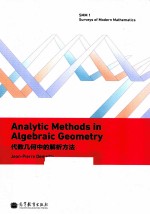图书介绍
代数几何中的解析方法 英文版PDF|Epub|txt|kindle电子书版本网盘下载

- (法)Jean-Pierre Demailly著 著
- 出版社: 北京:高等教育出版社
- ISBN:9787040305319
- 出版时间:2010
- 标注页数:231页
- 文件大小:44MB
- 文件页数:238页
- 主题词:代数几何-研究生-教材-英文
PDF下载
下载说明
代数几何中的解析方法 英文版PDF格式电子书版下载
下载的文件为RAR压缩包。需要使用解压软件进行解压得到PDF格式图书。建议使用BT下载工具Free Download Manager进行下载,简称FDM(免费,没有广告,支持多平台)。本站资源全部打包为BT种子。所以需要使用专业的BT下载软件进行下载。如BitComet qBittorrent uTorrent等BT下载工具。迅雷目前由于本站不是热门资源。不推荐使用!后期资源热门了。安装了迅雷也可以迅雷进行下载!
(文件页数 要大于 标注页数,上中下等多册电子书除外)
注意:本站所有压缩包均有解压码: 点击下载压缩包解压工具
图书目录
Introduction1
Chapter 1. Preliminary Material:Cohomology,Currents5
1.A. Dolbeault Cohomology and Sheaf Cohomology5
1.B. Plurisubharmonic Functions6
1.C. Positive Currents9
Chapter 2.Lelong numbers and Intersection Theory15
2.A. Multiplication of Currents and Monge-Ampère Operators15
2.B. Lelong Numbers18
Chapter 3.Hermitian Vector Bundles, Connections and Curvature.25
Chapter 4.Bochner Technique and Vanishing Theorems31
4.A. Laplace-Beltrami Operators and Hodge Theory31
4.B. Serre Duality Theorem32
4.C. Bochner-Kodaira-Nakano Identity on K?hler Manifolds33
4.D. Vanishing Theorems34
Chapter 5.L2 Estimates and Existence Theorems37
5.A. Basic L2 Existence Theorems37
5.B. Multiplier Ideal Sheaves and Nadel Vanishing Theorem39
Chapter 6.Numerically Effective and Pseudo-effective Line Bundles47
6.A. Pseudo-effective Line Bundles and Metrics with Minimal Singularities47
6.B. Nef Line Bundles49
6.C. Description of the Positive Cones51
6.D. The Kawamata-Viehweg Vanishing Theorem56
6.E. A Uniform Global Generation Property due to Y.T. Siu58
Chapter 7.A Simple Algebraic Approach to Fujita's Conjecture61
Chapter 8.Holomorphic Morse Inequalities71
8.A. General Analytic Statement on Compact Complex Manifolds71
8.B. Algebraic Counterparts of the Holomorphic Morse Inequalities72
8.C. Asymptotic Cohomology Groups74
8.D. Transcendental Asymptotic Cohomology Functions78
Chapter 9.Effective Version of Matsusaka's Big Theorem83
Chapter 10.Positivity Concepts for Vector Bundles89
Chapter 11.Skoda's L2 Estimates for Surjective Bundle Morphisms99
11.A. Surjectivity and Division Theorems99
11.B. Applications to Local Algebra: the Brian?on-Skoda Theorem105
Chapter 12.The Ohsawa-Takegoshi L2 Extension Theorem111
12.A. The Basic a Priori Inequality111
12.B. Abstract L2 Existence Theorem for Solutions of ?-Equations112
12.C. The L2 Extension Theorem114
12.D. Skoda's Division Theorem for Ideals of Holomorphic Functions122
Chapter 13.Approximation of Closed Positive Currents by Analytic Cycles127
13.A. Approximation of Plurisubharmonic Functions Via Bergman Kernels127
13.B. Global Approximation of Closed(1,1)-currents on a Compact Complex Manifold129
13.C. Global Approximation by Divisors136
13.D. Singularity Exponents and log Canonical Thresholds143
13.E. Hodge Conjecture and approximation of(p,p)- currents148
Chapter 14.Subadditivity of Multiplier Ideals and Fujita's Approximate Zariski Decomposition153
Chapter 15.Hard Lefschetz Theorem with Multiplier Ideal Sheaves159
15.A. A Bundle Valued Hard Lefschetz Theorem159
15.B. Equisingular Approximations of Quasi Plurisubharmonic Functions160
15.C. A Bochner Type Inequality166
15.D. Proof of Theorem 15.1168
15.E. A Counterexample170
Chapter 16.Invariance of Plurigenera of Projective Varieties173
Chapter 17.Numerical Characterization of the K?hler Cone177
17.A. Positive Classes in Intermediate(p,p)-bidegrees177
17.B. Numerically Positive Classes of Type(1,1)178
17.C. Deformations of Compact K?hler Manifolds184
Chapter 18.Structure of the Pseudo-effective Cone and Mobile Intersection Theory189
18.A. Classes of Mobile Curves and of Mobile(n-1,n-1)-currents189
18.B. Zariski Decomposition and Mobile Intersections192
18.C. The Orthogonality Estimate199
18.D. Dual of the Pseudo-effective Cone202
18.E. A Volume Formula for Algebraic(1,1)-classes on Projective Surfaces205
Chapter 19.Super-canonical Metrics and Abundance209
19.A. Construction of Super-canonical Metrics209
19.B. Invariance of Plurigenera and Positivity of Curvature of Super-canonical Metrics216
19.C. Tsuji's Strategy for Studying Abundance217
Chapter 20.Siu's Analytic Approach and P?un's Non Vanishing Theorem219
References223